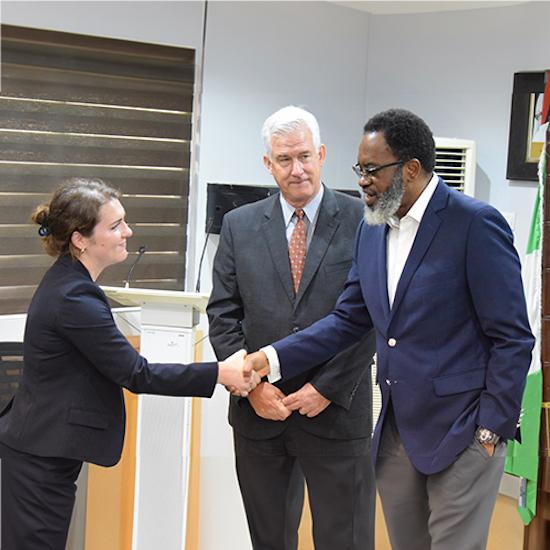Lagos Ministry of Justice Enlists Sudreau Global Justice Institute to Conduct a Comprehensive Evaluation

Pepperdine’s Sudreau Global Justice Institute (SGJI), an international human rights organization based out of the Caruso School of Law, recently completed a comprehensive evaluation of the Ministry of Justice in Lagos, Nigeria, at the request of Moyosore Onigbanjo, then the Honourable Attorney General and Commissioner of Justice (HAG/CJ) for Lagos State, as part of his efforts to increase access to justice and equity in the Lagos justice system. Lagos State is officially the second-most populous state in Nigeria, with an estimated 16 million residents. It is widely considered to be the financial center of Nigeria, and its economic and social influence spreads across Africa and the world.
“The goal of this project was to identify opportunities for increased efficiency and effectiveness in the administration of justice in Lagos,” says Cameron McCollum (JD ’17), SGJI’s director. “Honourable Attorney General Onigbanjo has a bold vision for increasing access to justice in Lagos, and Sudreau had the honor of taking on a consulting role. Leaning on our decades-plus of experience with access to justice and rule of law initiatives across Africa, and the experience of SGJI’s incredible network of experts, we were able to answer the question: What are creative ways to improve the administration of justice in Lagos given the current resources available?”
With the ultimate objective of improving the structure, staffing, and outcomes of the Ministry of Justice, SGJI representatives began the assessment process in August 2022 with the development of a working document outlining the various sectors of the ministry. Written questionnaires asked the employees of the directorates, agencies, initiatives, and units (DAIUs) that make up the Ministry of Justice for input on how they were currently performing and what improvements and innovations they would like to see in the future.
Over the next six months, responses were received from all 23 DAIUs, including the Public Defense Unit, the Directorate of Public Prosecution, and the Citizens’ Mediation Centre. In an effort to improve both effectiveness and efficiency, the questions were tailored to the functions of the individual DAIUs and designed to discover how the work of each DAIU intersected with that of other DAIUs at the Lagos Ministry of Justice. Virtual meetings were also held with members of the ministry’s leadership to refine the working document.
In March 2023, Alan Collier (JD ’90), SGJI’s director for West Africa, and Brynn Barton (JD ’21), SGJI’s West Africa legal fellow, traveled to Lagos to conduct in-person interviews with HAG/CJ Onigbanjo and Solicitor General and Permanent Secretary (SG/PS) Khadijat Titilayo Shitta-Bey, as well as directors, key leaders, and other staff members within the DAIUs. (Barton and Collier are pictured with HAG/CJ Onigbanjo in the photograph above.)
While all 23 groups were discussed in the final change model report, groups from 18 of the DAIUs were interviewed in person. The other five groups were analyzed based on discussions with the ministry leadership as well as written submissions.
The interviews addressed the responses to the questionnaires and also sought further information about issues such as the mission, functionality, and morale of each DAIU. “The interviews functioned as a time to connect personally with each team to establish trust and further the relationship between the SGJI team and the Lagos Ministry of Justice leadership and key team members,” says Collier. “This connection allowed for frank and honest discussions and, in our opinion, created a bond of trust that will support further work by SGJI at the Ministry of Justice, if that’s desired by the HAG/CJ and the SG/PS. Brynn Barton and I were very impressed by the level of commitment displayed by the entire Ministry of Justice and its openness to reforms that could lead to better access to justice for the citizens of Lagos State.”
An expert advisory council reviewed the comprehensive report compiled by SGJI and provided recommendations to the Ministry of Justice. Members of the advisory council included Jonathan Skrmetti, Tennesse’s attorney general, and Donald Earl Childress III, professor of law at Pepperdine and former counselor on international law in the Office of the Legal Adviser for the US State Department, as well as leaders from the offices of several Southern California district attorneys and partners from other nongovernmental organizations with expertise in the administration of justice in both the United States and abroad. These recommendations were incorporated into the final change model report, which also included proposed organizational charts that reflected the findings. This report was submitted to the HAG/CJ’s office and the Ministry of Justice in July, and SGJI will continue to partner with members of the Lagos government as they analyze the report and decide on a course of action.
The project has been a success, according to Olamide Ibrahim, senior special assistant at the Lagos State Ministry of Justice. “I am truly impressed by the outstanding work of the Pepperdine team from the Sudreau Global Justice Institute,” he says. “Their commitment to this comprehensive evaluation project has been exemplary, and the results they’ve delivered are incredibly promising. This partnership has not only showcased their expertise but also demonstrated their genuine dedication to helping us enhance the Ministry of Justice’s efficiency and effectiveness. I have full confidence that our collaboration with the Pepperdine team will continue to yield transformative outcomes, and I look forward to the positive impact it will have on our mission to provide access to justice and equity for the people of Lagos State.”
As Collier observes, “This is the beginning of something very exciting and influential not only for Lagos State but, due to its influence, will hopefully lead to a ripple effect of best practices in access to justice across the other 35 states of Nigeria as well as the entire region of West Africa and beyond.”